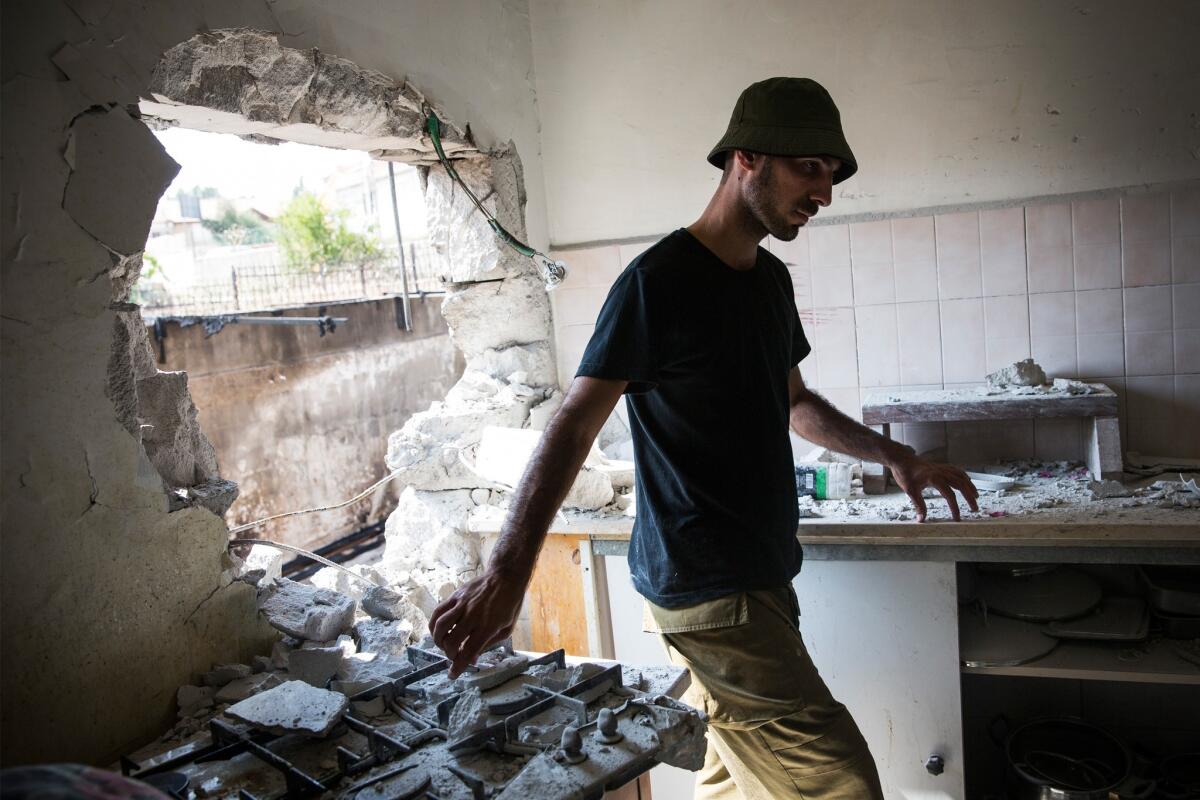Op-Ed: A Gaza solution: demilitarization

- Share via
The key to ending the current battle between Hamas and Israel — and preventing more fighting in the future — is the demilitarization of Gaza. Simply put, Hamas without rockets is not the same Hamas.
That solution, though seemingly uncomplicated, has given rise to questions about its practicality. Is it possible? Are there precedents? How could disarmament be implemented and its permanence assured? And who would lead the effort, guaranteeing that removing rockets from Gaza would benefit Palestinians and Israelis alike and advance the cause of peace?
Demilitarization indeed has precedents, beginning with the 1982 evacuation of the Palestine Liberation Organization from Beirut. While Israeli troops besieged the city, the U.N. Security Council enacted Resolutions 508 and 509, which created an international force to facilitate the PLO’s exit. Similarly, today, the Security Council could authorize international action to oversee Gaza’s disarmament. Rockets, mortars and other heavy weapons could then be safely transported to a designated site and destroyed.
More specific models for demilitarization are contained in the reports submitted by Sen. George Mitchell and CIA Director George Tenet at the height of the second intifada in 2001. Both recommended creating a Palestinian state in stages, beginning with the disarming of Palestinian factions. That process would be carried out by the Palestinian Authority — currently confined to the West Bank — which recognized Israel and committed to the peace process. The Mitchell and Tenet proposals remain integral to U.S. policy. The Obama administration supports the establishment of a demilitarized Palestinian state.
President Obama also provided the most recent precedent for demilitarizing Gaza: the removal of chemical weapons from Syria. By threatening to use military force against Damascus, the president persuaded Syrian dictator Bashar Assad to surrender his chemical arsenal. Once considered the source of the chemical weapons problem, Assad became a partner in resolving it.
Hamas could do the same. Largely friendless in the world and facing numerous adversaries, Hamas could trade its rockets for at least implicit recognition of its status in Gaza. It could be compensated with international aid for Gaza’s civilians, the reopening of border crossings and the easing of Israel’s maritime blockade. Hamas could also become part of the solution.
So, too, must the Palestinian Authority. In recent days, President Mahmoud Abbas offered to deploy his American-trained security forces at strategic points on Gaza’s borders. Adding disarmament to these forces’ task would strengthen moderate Palestinians and establish the principle — fundamental to sovereignty — that their government is maintaining a monopoly over armed power. According to a Palestinian survey taken last month, 88% of Gaza’s population favors the stationing of disciplined Palestinian Authority forces in the area. Gaza guarded by Palestinian Authority policemen from the West Bank is less likely to become a launching pad for missile attacks against Israel.
None of these measures can happen without leadership. The United States must unite with international and regional governments to convince Hamas that it has no choice but to demilitarize. Other states — Qatar and Turkey — must affirm that their aid to Gaza will be used to build hospitals and schools rather than military bunkers and attack tunnels. The Israelis must be reassured that inspectors will remain in Gaza to prevent Hamas attempts at rearmament. And the Palestinian Authority must be guaranteed that assuming security responsibilities in Gaza is a step toward, rather than a detour from, independence.
Still, even with precedents and effective leadership, Hamas is sure to cling bitterly to its rockets. And unlike the Hamas tunnels, which can be destroyed by a limited Israeli incursion, silencing the rocket fire may require reoccupying most of Gaza. That is why Israel must be allowed to maintain — and, if necessary, escalate — its pressure on Hamas. Just as a credible military threat provided the leverage for extracting the PLO from Beirut and for convincing Assad to relinquish Syria’s chemical weapons, so too must Israel’s operations, crucial to defending its citizens from almost 1,900 Hamas rockets, be recognized as legitimate by the international community.
This may be the greatest challenge en route to demilitarization. Though Israel will continue to exercise extraordinary caution to minimize innocent casualties, combating an enemy that uses civilians as human shields will invariably prove controversial. The painful images of human suffering must not deprive us — Israelis and Palestinians — of the opportunity to restore our daily lives and reopen possibilities for peace.
Michael B. Oren, former Israeli ambassador to the United States, holds the chair in international diplomacy at the Interdisciplinary Center Herzliya and is a fellow at the Atlantic Council.
Follow the Opinion section on Twitter @latimesopinion
More to Read
A cure for the common opinion
Get thought-provoking perspectives with our weekly newsletter.
You may occasionally receive promotional content from the Los Angeles Times.








